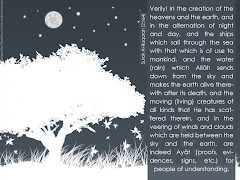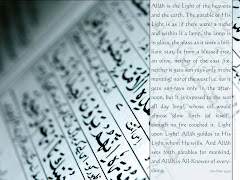
We seek refuge in Allah against satan, the cursed creature
Bismillahi Rahmani Rahim
The following presentation will bring to light the common misconceptions often resulting from the unfamiliarity of Islam in the western hemisphere. These misunderstandings are the longtime barriers that keep many people from looking into Islam directly from the source. To address these issues we'll touch base on what Islam advocates as a doctrine classified among the three revelations that emerged within the family of Abraham (Judaism and Christianity are the two previous revelations).
I. Clarifying the misconceptions
Although the true teachings of Islam are now more accessible to western countries than ever before, studies show that the upright information on Islam still remained unknown to the majority of people living in the west. Part of this problematic is of course due to the skepticism generated by the controversial groups who operate under religious claim. These organizations are in fact personal interest groups who promote ideologies that are not in line with the values and teachings of Islam. This is factual evidence can be easily verified by referring to the source which clearly defines what Islam stands for (NB: Please check Quranic references at the end of section I. for further details on this matter).
That being said, when looking for relevant information on Islam, we should be also aware of the fact that the news coverage mainly deals with the socio political issues not religion. Hence to have an understanding of the religious aspect we need access to more info beyond the typical media coverage. That's why the truth in the religious texts should be considered in an effort to separate facts from presumptions. This is indeed the standpoint from which the big picture should be looked at in order to keep the news issues in the context they belong. It must be also realized that the Muslim community is represented by a large and diverse population estimated 1.57 billion adherents (rf: Wikipedia, 2009 data). So Islam is not just followed in the Arab world nor is it an affair of culture or race. This is important to know, especially when only 18 to 20 percent of Muslims live the Middle East and other Arabs countries. The majority of the Muslim demographic is actually found in different parts of Asia and in Sub-Saharan Africa. And today, Indonesia (the world's fourth most populous country) represents the largest Muslim community with approximately 86.1% Muslims (about 200 million Muslims); its remaining population is composed of 8% Christians and 5.2% other beliefs.
So to recap, we'll say that the introduction to any particular religion should at least require having access to truthful sources and/or interacting with a student of faith who knows well the religion in question. Doing so will ensure the most accurate information and prevent quick judgments based on the irresponsible actions of some so called "religious followers".
Notes: To seize the message of Islam from an objective point of view, we highly recommend the reader to look further into the Quran and other reliable references on Islam. A free copy of the Quran is available through the following websites.
http://www.allahsquran.com/free/
http://www.convertstoislam.org/resources/Free-Quran.htm
http://www.restoration-experts.com/ORC/ORH/FQ/fq.html
Notes for Muslims readers: The contain of our presentation is not just directed to those outside the Muslim community; this is also a reminder to Muslims that part of our responsibility is to be actively engaged in conveying the absolute truth about Islam, particularly in countries where the message is unknown by the majority of people.
May Allah give us knowledge of Islam and the opportunity to share it with others “Inch Allah”, AMIN..!
II. / Q: What Islam advocates?
A: The message of continuity in all revelations of God (Allah is the Arabic translation emphasizing on the Oneness of God)
The theology of Islam stands on the fundamental belief that God sent down guidance to mankind through prophets starting from Adam to Noah, Abraham, Moses, Jesus and finally Mohammed (May peace be upon them). These were all messengers at the service of God who presented the same message of continuity to mankind. The holy Quran states explicitly that the messengers fully conducted their duty which consists of providing humans beings with valuable knowledge in need of for spiritual gain and eternal salvation. These prophets were sent through time and space, under different circumstances that justify the particularities of their mission. These circumstances however do not affect the fundamental message of God, which remains the same regardless of time and place.
Now a look at today's countless conceptions of religion proves clearly that there is a serious lack of consistency in the way religious teachings have been carried over through generations and family descendants. In fact references from the Quran and previous scriptures show that the authentic message from God is particularly neglected in the period following the departure of an appointed messenger. Many events narrated in the Quran and the hadith books (i.e legacy of the messenger Muhammad, pbuh) indicate that whenever a messenger establishes guidance as prescribed by God, time will come when many people will again wander away from that guidance. It's through this process that society has actually inherited different versions of religious beliefs and interpretations brought up through history. This is also one of the factors that ultimately contributed into much religious carelessness and hypocrisy, even among educators in the clergy who are sometimes far from following the guidelines they advocate.
However there is no doubt that God has sent several messengers to preserve true monotheism on earth and save many from being misled. These messengers were the confirmation that eternal salvation is the highest achievement of the human being. Nevertheless it shouldn't be overlooked that the path to this achievement is often at a closer reach of those with sincere intention, who ask the Creator of the heavens and the earth to guide them to righteousness (i.e. true religion as defined by Almighty God). As we all know not everyone is interested in religious aspiration; history has proven that even when God shows clear manifestations through the attributes of His prophets, certain individuals still reject His message. Such was the case at the time of Noah, Abraham, Moses and many others prophets (p.b.u.them). So this should bring us to understand that seeking spiritual guidance should not be just a mere wish, but rather a real desire which should motivate the one in search of true success.
Summary
In sum, let's retain that Islam is not a new religion, instead it is the reaffirmation of the religious truth given to all messengers (p.b.u them). This religious truth is a blessing of the Most High for the benefit of mankind in this world and the hereafter. Thus the analysis of monotheism throughout the prophetic descendants of Adam (pbuh) should lead inevitably to the mission of continuity pursued by all messengers who made tremendous sacrifices to spread the Word of God. Twenty five amongst these holy men are mentioned in the Quran, yet the Quran tells us that there were many others as well entrusted with the Devine message. As stated in the hadith books the actual number was 124000 prophets and 313 messengers.
NB: The prophets by definition are guardians in charge of safeguarding the revelations given to previous messengers. The messengers on the other hand consist of a certain number of prophets who received scriptures and laws through the Angel Gabriel (pbuh).
Now the main question to ask is what was really the turning point in history that brought to an end the coming of these messengers/prophets? This question begs for an answer; to find that answer we invite the reader to take a closer look at the particularities of the last doctrine revealed within the Abrahamic family.
Final words:
All of us human beings follow two paths; one that is given to us at birth by our family or environment, and one that we choose to follow as we reach full maturity. Now when the manifest truth is exposed at death, all of us will want our actions to fit right in place with the commands of Almighty God. Hence, before that defining moment arrives, seeking to be in peace with God should a priority for anyone who has faith in Him. This comes down to a profound statement made by a Muslim scholar who said, '' son of Adam (pbuh), you're born crying while those around you were rejoicing [your birth], but at the end make sure you're the one rejoicing [the hereafter] while others are crying [for your departure]''
To be continued...














































